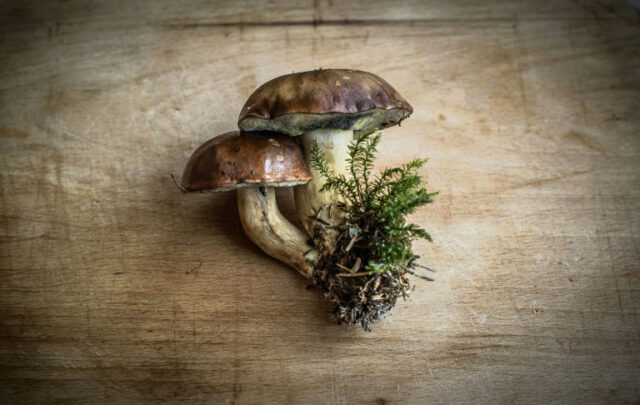My four year old daughter recently arrived home carrying a paper Tesco bag. She’d had a strange kind of school trip. They went to a local mill to see how it worked and then they took the flour from the mill over to Tesco, where they made hot cross buns in the bakery. Now the thing that bothers me about this, outside of my general dislike for this major supermarket, is that Tesco doesn’t carry the flour from the local mill and they are not generally known to have anything to do with local producers around here, so why were they stepping-up and offering their kitchen facilities to teach my child about bread-making? It all became clear when I looked at the bag she was carrying. On it, it read ‘I learned where my food comes from today,’ and then ‘Farm to Fork’ at the bottom, followed by the Tesco logo.
I looked in the bag – there was a banana, an apple and her hot cross bun. I asked her where they came from. ‘The cafeteria,’ she replied. I pressed her a bit – did they tell her anything more about the apple or banana? She looked at me blankly. I tried again, more pointedly, did they tell her where they were grown? She shook her head.
So what she learned really, was that the apple and banana come from the supermarket, along with her hot cross bun. It’s an apt message for Tesco to pass on, but it doesn’t have anything to do with ‘Farm to Fork,’ and it more than irritates me that Tesco supermarket is teaching my child that they are the point of contact if you want to engage with farmers or local food.
 I asked her where the food we eat at home comes from. ‘The field,’ she replied – clever, girl! We are organic vegetable growers. We have a small farm and we grow and sell everything within about 40 miles of the farm. What we do is farm to fork. You buy it from the farmer and you cook it for your dinner – there’s no supermarket in the middle of it. Major supermarkets are the main reason that farmers are struggling to stay in the black. A lot of farmers like us (incomers into farming, who didn’t inherit their farm) are doing everything they can to circumvent the supermarket and access their markets directly.
I asked her where the food we eat at home comes from. ‘The field,’ she replied – clever, girl! We are organic vegetable growers. We have a small farm and we grow and sell everything within about 40 miles of the farm. What we do is farm to fork. You buy it from the farmer and you cook it for your dinner – there’s no supermarket in the middle of it. Major supermarkets are the main reason that farmers are struggling to stay in the black. A lot of farmers like us (incomers into farming, who didn’t inherit their farm) are doing everything they can to circumvent the supermarket and access their markets directly.
We’ve recently been discussing the so-called ‘cheap’ food that supermarkets are known for, which isn’t nearly as cheap as you’d think in a variety of ways. The cost of food has been going up in the last five years and it’s one of the reasons that a growing number of us can’t keep up with the cost of living. We’ve also been discussing the perception of cheap and all those BOGOFs and cut-price deals, which can create the illusion that you’re getting a deal on your purchases, whilst the reality of rising food prices tells quite a different story.
This was brought home to me last week. We had a new customer join our box scheme. We delivered him a large box of seasonal organic vegetables all of which, except for the root veg which is out of the ground by this time in the season, was picked within 24 hours of its delivery. People are almost always very happy with what they get, but this time we got an angry email from our new customer. ‘I could have bought this for £6 at the supermarket.’ I wrote back that as small scale producers, we couldn’t compete on staples like potatoes and onions, but that we regularly price checked all our vegetables against Tesco (which dominates in our rural community), since we are conscious about keeping our prices reasonable and I felt we offered good value. He scoffed at me in his reply, he didn’t think it was good value. I told him, we were happy to refund his money.
 A bit bruised by this exchange, I worried that maybe we’d gotten way off in our pricing somewhere. So I had a look at what the box scheme items were selling for at Tesco. I tracked the price on comparable items. Where there was organic produce on sale at Tesco, I tracked its price by the kilo; otherwise I took the conventional kilo price. I was pretty sure we’d be more expensive, but by how much was the question? Just 73p more expensive as it turned out. And nearly half the items from Tesco were conventional because they didn’t have them as organic.
A bit bruised by this exchange, I worried that maybe we’d gotten way off in our pricing somewhere. So I had a look at what the box scheme items were selling for at Tesco. I tracked the price on comparable items. Where there was organic produce on sale at Tesco, I tracked its price by the kilo; otherwise I took the conventional kilo price. I was pretty sure we’d be more expensive, but by how much was the question? Just 73p more expensive as it turned out. And nearly half the items from Tesco were conventional because they didn’t have them as organic.
I noticed a couple of interesting things: anything that was in the least bit unusual – purple sprouting broccoli, chard, even parsnips – were more expensive than our local veg; and if there was an organic version of more common vegetables, they were significantly more expensive than their conventional counter-parts. Take cauliflowers for example – a conventional cauliflower was selling at £1, but the organic one was £2 – a full 25p more than our organic cauliflower. In the end, it all came out in the wash, so to speak and there was only that small handful of change between us.
Except that in reality there is a whole lot more difference between what you get in our box in terms of value than what you get from a supermarket. For starters, we’re caring for the land we farm on – as part of an organic system, we don’t use pesticides or nitrogen fertilizers, which damage both flora and fauna. That also means that there’s no pesticide residues on our food. Soil is our most important asset, so we do everything we can to keep it in good health. We protect wildlife habitats, by maintaining hedgerows and healthy field margins, and we don’t intensively farm a single-crop repeatedly in the same soil. We keep our food miles to a minimum, cutting greenhouse gas emissions that are causing climate change. We employ local people, so money spent with us stays in the community, and we do our best to build community around the food we sell, so that the educational benefits of our production can be shared with those around us. All for an extra 73p! For the extra-handful of change, I think the range of benefits delivered, represent extremely good value for money.
We’re interested to hear your experiences of shopping at the supermarkets compared to farmers markets or box-schemes. Do you think the supermarkets are as cheap as they claim to be, or have you noticed the cost of your weekly shop rising?
Photograph of Tesco by Axel Drainville





